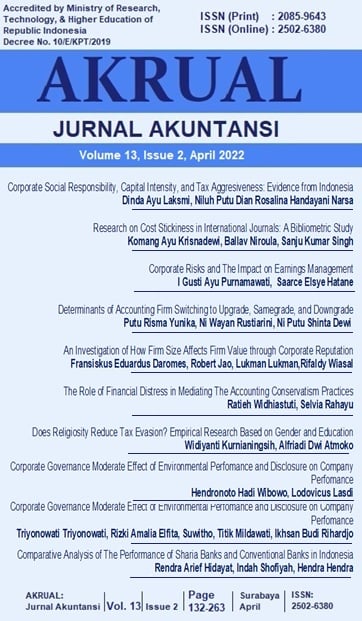Determinants of Accounting Firm Switching to Upgrade, Samegrade, and Downgrade
DOI:
https://doi.org/10.26740/jaj.v13n2.p173-186Keywords:
accounting firm, financial distress, profitability, ownershipAbstract
This study analyzes the non-financial and financial factors that affect accounting firms switching, namely upgrade, samegrade, or downgrade. Non-financial factors are proxied by managerial ownership and management turnover, while financial factors are proxied by profitability and financial distress. The population was manufacturing companies on the Indonesia Stock Exchange in 2017-2019. The research sample was selected using the purposive sampling method. The sample in this study amounted to 31 manufacturing companies, so the total sample was 93 company units. The analytical tool used to test the hypothesis is multinomial logistic regression analysis. The results of this study indicate that managerial ownership does not affect the three types of turnover. Meanwhile, the management turnover variable positively affects the upgrade, samegrade, and downgrade. In terms of financial factors, profitability does not affect upgrade and downgrade accounting firms of switching. Nevertheless, profitability has a positive effect on the samegrade type of switching. Hypotheses testing of financial distress revealed that this variable could not influence the three accounting firm switching
References
Brigham, E. F., & Houston, J. F. (2006). Dasar-Dasar Manajemen Keuangan (10th ed.). Salemba Empat.
Ghozali, I. (2016). Aplikasi Analisis Multivariate dengan Program IBM SPSS 23. BPFE Universitas Diponegoro.
Goverment Regulation No. 20 of 2015 concerning Public Accountant Practices, (2015).
Minister of Finance Decree No. 17/PMK.01/2008 concerning Public Accountant Services, (2008).
Downloads
Published
How to Cite
Issue
Section
License
Copyright (c) 2021 AKRUAL: Jurnal Akuntansi

This work is licensed under a Creative Commons Attribution-NonCommercial 4.0 International License.
 Abstract views: 596
,
Abstract views: 596
, PDF Downloads: 591
PDF Downloads: 591


















